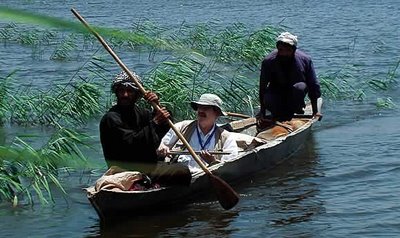Below is an article written by Peter Galbraith, published in the Washington Post in April, 2003. Galbraith was in rebel-held Iraq during the 1991 uprising, and in this article he explains much better than I can how the US betrayed the Iraqi Shia in 1991.
*Updated 12/29/09: Turns out Saddam kept most of his Republican Guards out of Kuwait.
The Ghosts of 1991
By Peter W. Galbraith
Saturday, April 12, 2003; Page A19
'Can it be that the events of 2003 in Iraq have finally dispelled the ghosts of 1991? The answer may not be quite as obvious as the welcoming throngs make it seem.
Just 12 years ago, the Shiite Muslims who constitute a majority in Iraq and in the city of Baghdad were betrayed by the United States -- an act that may have cost them as many as 100,000 lives [and many thousands more in following years]. That recent history -- of which the Shiites are understandably a good deal less forgetful than we -- explains why the Shiites in the south initially greeted invading American and British forces with a good deal more reserve than expected. And as the continuing turmoil in southern towns and cities makes clear, building a democratic state in Iraq over the long term will depend to a large degree on how strong and lasting a trust we can build among these people.
The spontaneous Shiite uprising of 1991 consumed the southern part of Iraq right up to the approaches to Baghdad. Rebels came to U.S. troops, who were then deployed in the Euphrates Valley, begging for U.S. intervention. The Shiite political parties sent emissaries to the few Americans who would see them. To this day, I am haunted by the desperation in the appeals made to me by one group, as they realized time was running out for their countrymen.
Many of the problems we face now and in the future with Shiites likely have to do with the way the first Bush administration responded to those appeals. On Feb. 15, 1991, President George H.W. Bush called on the Iraqi military and people to overthrow Saddam Hussein. On March 3, an Iraqi tank commander returning from Kuwait fired a shell through one of the portraits of Hussein in Basra's main square, igniting the southern uprising. A week later, Kurdish rebels ended Hussein's control over much of the north.
But although Bush had called for the rebellion, his administration was caught unprepared when it happened. The administration knew little about those in the Iraqi opposition because, as a matter of policy, it refused to talk to them. Policymakers tended to see Iraq's main ethnic groups in caricature: The Shiites were feared as pro-Iranian and the Kurds as anti-Turkish. Indeed, the U.S. administration seemed to prefer the continuation of the Baath regime (albeit without Hussein) to the success of the rebellion. As one National Security Council official told me at the time: "Our policy is to get rid of Saddam, not his regime."
The practical expression of this policy came in the decisions made by the military on the ground. U.S. commanders spurned the rebels' plea for help. The United States allowed Iraq to send Republican Guard units into southern cities and to fly helicopter gunships. (This in spite of a ban on flights, articulated by Gen. Norman Schwarzkopf with considerable swagger: "You fly, you die.") The consequences were devastating. Hussein's forces leveled the historical centers of the Shiite towns, bombarded sacred Shiite shrines and executed thousands on the spot. By some estimates, 100,000 people died in reprisal killings between March and September. Many of these atrocities were committed in proximity to American troops, who were under orders not to intervene.
In recent years Baghdad has shortchanged the south in the distribution of food and medicine, contributing to severe malnutrition among vulnerable populations. Some 100 Shiite clerics have been murdered, including four senior ayatollahs. Draining the marshes displaced 400,000 Marsh Arabs, destroying a culture that is one of the world's oldest, as well as causing immeasurable ecological damage.
The first Bush administration's decision to abandon the March uprising was a mistake of historic proportions. With U.S. help, or even neutrality, the March uprising could have succeeded, thus avoiding the need for a second costly war. (Bush's defenders insist the United States had no mandate to carry the war to Baghdad, but this is beside the point. The uprising started after the Gulf War ended, and the United States was positioned to easily down Iraqi helicopters and halt Iraqi tanks.)
The current President Bush cannot escape these ghosts. An American may understand what happened in 1991 as carelessness -- inexcusable but not malicious. An Iraqi Shiite saw a superpower that called for a rebellion and then ensured its failure. Naturally, he assumed this was intentional. In the months and years to come, many Shiites may take a lot of convincing about U.S. motives and reliability.
President George W. Bush has done much right that his father did wrong. His administration has been in constant contact with the Iraqi opposition. Humanitarian supplies are being rushed to southern Iraq, and clear warnings were issued against those who might have committed atrocities in the first days of the invasion. Unfortunately, the president carries a national and family legacy that many Iraqis associate with deadly betrayal. Overcoming that legacy has only begun. It is one of the critical challenges that lie ahead.'
Marsh Arabs



No comments :
Post a Comment